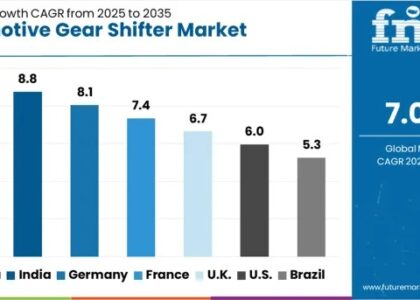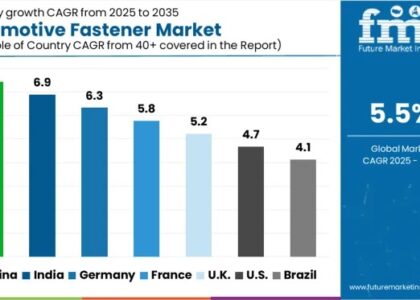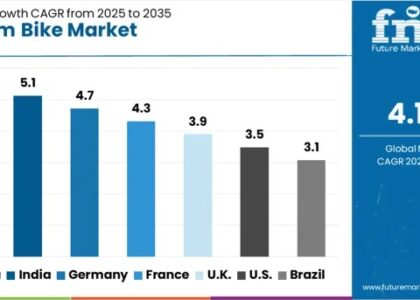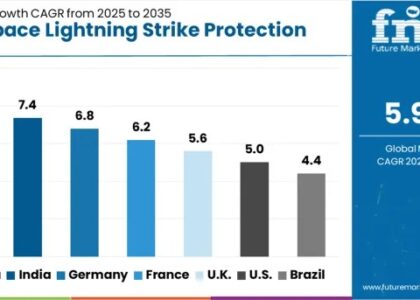
The Automotive E-Compressor Market is experiencing rapid growth due to the increasing adoption of electric and hybrid vehicles (EVs & HEVs) and the rising demand for energy-efficient climate control systems. Unlike traditional belt-driven compressors, electric compressors (E-compressors) operate independently of the engine, improving fuel efficiency and reducing emissions. With the shift toward vehicle electrification and advancements in thermal management systems, the market for automotive E-compressors is poised for significant expansion.
In 2025, the automotive E-compressor market is set to reach a valuation of USD 2.5 billion. It is estimated that by 2035, it will grow to USD 5.8 billion at a CAGR of 11.3%. The main drivers of this growth rate are the higher diffusion of electric vehicles, the reformation of standards of environmental protection, along with the improvement of technology in e-compressors, which, in turn, will make power consumption less and performance more.
The industry development is also supported by the comprehensive process of electrification of vehicles and the increased production of air conditioning units and battery-cooling units for electric vehicles and hybrids. The automotive e-compressor market enjoys consistent upward trend being favored by the rising need for electric vehicles (EVs) and the expanding interest in energy efficiency and sustainability in automotive business.
Rather than conventional belt-driven compressors, e-compressors are able to operate without the engine running, thereby offering improved energy efficiency, reduced emissions, as well as design flexibility in the vehicle. However, automotive e-compressors despite the favorable potential for growth have to overcome issues such as high initial costs, difficulties in integration, and concerns about battery efficiency.
Although e-compressors tend to deliver better efficiency eventually, they incur more costs in terms of purchase at the beginning when they are compared to conventional compressors. This is why we notice refusal of the technology in some price-oriented/spared markets. Besides, the incorporation of these systems into traditional internal combustion engine vehicles or hybrid models requires extensive engineering modifications, and this raises the cost of production.
Another significant problem is to make sure that e-compressors will function satisfactorily without draining the EV batteries so fast, especially in severe heat where thermal management is key to the vehicle range. The requirement of energy-saving solutions during cooling performances and the lifespan of the battery is a must for the manufacturers.
The industry turns to be favorable mainly because of the global growth of electricity-based vehicles, technological advances that keep happening, as well as the formation of new regulations that promote sustainability.
Get Ahead with Our Report: Request Your Sample Now!
https://www.futuremarketinsights.com/report-sample#5245502d47422d3137323030
Key Takeaways
-
The global automotive E-compressor market is driven by the increasing adoption of EVs and HEVs.
-
Energy-efficient climate control solutions are essential for improving battery performance and vehicle range.
-
Government regulations promoting low-emission vehicles are accelerating E-compressor adoption.
-
OEMs are integrating compact, lightweight, and high-performance E-compressors into next-gen vehicles.
-
Asia-Pacific dominates the market, led by China, Japan, and South Korea, while North America and Europe see growing demand.
Key Drivers
-
Rising Demand for EVs & HEVs: As automakers transition to electrified powertrains, the need for energy-efficient air conditioning and thermal management solutions is increasing.
-
Stringent Emission Regulations: Global policies targeting CO₂ reduction and fuel efficiency encourage the adoption of electric compressors in low-emission vehicles.
-
Advancements in Thermal Management Systems: E-compressors contribute to optimal battery temperature control, improving EV battery life and efficiency.
-
Improved Energy Efficiency Over Conventional Compressors: Unlike traditional belt-driven compressors, E-compressors function independently, consuming less power and reducing vehicle energy consumption.
-
Integration with Heat Pumps for Extended EV Range: E-compressors are increasingly being used in heat pump systems, which help optimize cabin heating and cooling while maximizing EV range in extreme temperatures.
Growth Opportunities
-
Development of Next-Gen Compact & Lightweight E-Compressor Designs for improved efficiency
-
Advancements in Smart & AI-Integrated Thermal Management Solutions
-
Increasing Use of E-Compressor in Commercial Electric Vehicles (e-buses, electric trucks, fleet vehicles)
-
Expansion in Emerging Markets with Rising EV Adoption
-
Integration of E-Compressors with Renewable Energy-Based Vehicles
Key Applications
-
Passenger Electric Vehicles (EVs & HEVs)
-
Commercial Electric Vehicles (E-Buses & Electric Trucks)
-
Plug-in Hybrid Electric Vehicles (PHEVs)
-
Luxury & High-Performance Vehicles
Detailed Market Study: Full Report and Analysis
https://www.futuremarketinsights.com/reports/automotive-e-compressor-market
Key Players
-
Denso Corporation
-
Valeo SA
-
Sanden Holdings Corporation
-
Hanon Systems
-
MAHLE GmbH
-
Toyota Industries Corporation
-
Brose Fahrzeugteile GmbH & Co. KG
-
Mitsubishi Heavy Industries Ltd.
-
BorgWarner Inc.
-
Highly Marelli Holdings Co., Ltd.
Key Segmentations
-
By Vehicle Type: Passenger Vehicles, Commercial Vehicles, Off-Highway Vehicles
-
By Drive Type: Battery Electric Vehicles (BEVs), Hybrid Electric Vehicles (HEVs), Plug-in Hybrid Electric Vehicles (PHEVs)
-
By Cooling Capacity: Less than 2 kW, 2–3.5 kW, More than 3.5 kW
-
By Sales Channel: OEMs, Aftermarket
-
By Region: North America, Europe, Asia-Pacific, Latin America, Middle East & Africa
About Future Market Insights (FMI)
Future Market Insights, Inc. (ESOMAR certified, recipient of the Stevie Award, and a member of the Greater New York Chamber of Commerce) offers profound insights into the driving factors that are boosting demand in the market. FMI stands as the leading global provider of market intelligence, advisory services, consulting, and events for the Packaging, Food and Beverage, Consumer Technology, Healthcare, Industrial, and Chemicals markets. With a vast team of 400 analysts worldwide, FMI provides global, regional, and local expertise on diverse domains and industry trends across more than 110 countries.
Contact Us:
Future Market Insights Inc.
Christiana Corporate, 200 Continental Drive,
Suite 401, Newark, Delaware – 19713, USA
T: +1-845-579-5705
For Sales Enquiries: sales@futuremarketinsights.com
Website: https://www.futuremarketinsights.com
LinkedIn| Twitter| Blogs | YouTube





